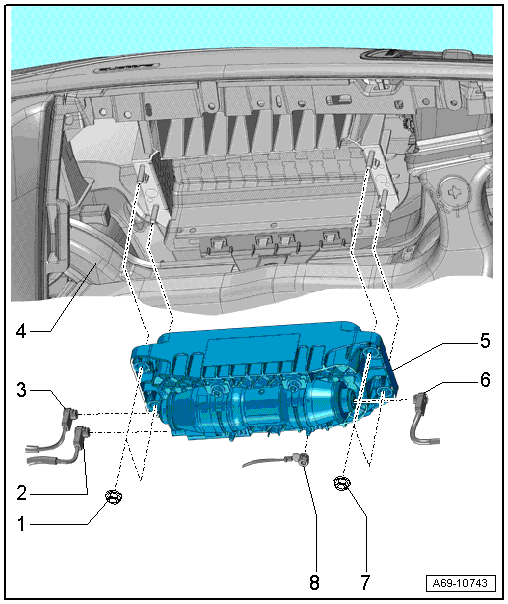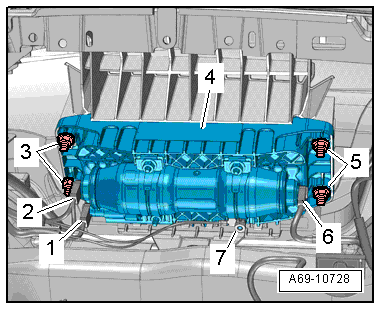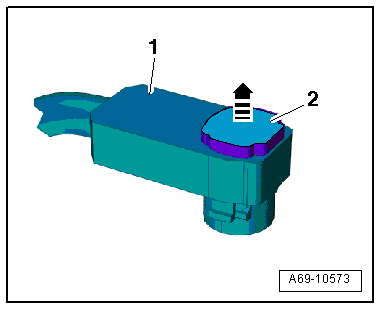Audi A6 Typ 4G: Front Passenger Airbag
Overview - Front Passenger Airbag

1 - Nut
- 9 Nm
- Quantity: 2
- Replace
2 - Connector
- For Front Passenger Airbag Release Valve Igniter -N491-
 WARNING
WARNING
Replace the connector after the airbag has deployed. Refer to → Electrical Equipment General Information; Rep. Gr.97; Wiring Harness and Connector Repairs.
3 - Connector
- For Front Passenger Airbag Igniter 1 -N131-
4 - Instrument Panel
- Replace the instrument panel after an airbag has deployed. Refer to → Chapter "Instrument Panel, Removing and Installing".
5 - Front Passenger Airbag
- With the Front Passenger Airbag Igniter 1 -N131-/Front Passenger Airbag Release Valve Igniter -N491-
- Market-specific with Front Passenger Airbag Igniter 2 -N132-
 WARNING
WARNING
- Follow all Safety Precautions when working with pyrotechnic components. Refer to → Chapter "Pyrotechnic Components Safety Precautions".
- Follow the allocation of the airbag unit to the instrument panel. Refer to the Parts Catalog.
- Locking and activating possible with key switch
- Removing and installing. Refer to → Chapter "Front Passenger Airbag Unit with Igniter, Removing and Installing".
6 - Connector
- For market versions with Front Passenger Airbag Igniter 2 -N132-
7 - Nut
- 9 Nm
- Quantity: 2
- Replace
8 - Ground (GND) Cable
- 9 Nm
Front Passenger Airbag Unit with Igniter, Removing and Installing
Removing
 WARNING
WARNING
- Follow all Safety Precautions when working with pyrotechnic components. Refer to → Chapter "Pyrotechnic Components Safety Precautions".
- Follow all regulations when disposing of pyrotechnic components. Refer to → Chapter "Airbag, Belt Tensioner and Battery Cut-Out Units, Storing, Transporting and Disposing".
- Follow the allocation of the airbag unit to the instrument panel. Refer to the Parts Catalog.
- Disconnect the battery Ground (GND) cable with the ignition turned on. Refer to → Electrical Equipment; Rep. Gr.27; Battery; Battery, Disconnecting and Connecting.
- Remove the glove compartment. Refer to → Chapter "Glove Compartment, Removing and Installing".
 WARNING
WARNING
Before handling pyrotechnic components (for example, disconnecting the connector), the person handling it must "discharge static electricity". This can be done by touching the door striker, for example.
- Remove the nut -7- and GND wire.
- Disconnect the connectors:
1 - Front Passenger Airbag Release Valve Igniter -N491-
2 - Front Passenger Airbag Igniter 1 -N131-
6 - Front Passenger Airbag Igniter 2 -N132- - country-specific

- Release the connector lock -2- with a small screwdriver -arrow- and disconnect the connector -1-.

- Remove the nuts -3 and 5-.
- Remove the passenger airbag -4- downward.
 WARNING
WARNING
Set the airbag down so the impact cushion faces upward.
Installing
 WARNING
WARNING
- Follow all Safety Precautions when working with pyrotechnic components. Refer to → Chapter "Pyrotechnic Components Safety Precautions".
- Before handling pyrotechnic components (for example, connecting the connector), the person handling it must "discharge static electricity". This can be done by touching the door striker, for example.
- Follow the allocation of the airbag to the instrument panel. Refer to the Parts Catalog.
- Replace the connector for the Front Passenger Airbag Release Valve Igniter -N491- after the airbag has deployed. Refer to → Electrical Equipment General Information; Rep. Gr.97; Wiring Harness and Connector Repairs.
Install in reverse order of removal. Note the following:
 Note
Note
- Make sure the connectors are installed correctly and are secure.
- Make sure the wires do not get caught.
 WARNING
WARNING
Ignition must be on when connecting battery. If pyrotechnic components (for example, airbag, belt tensioner) are not repaired correctly, they may deploy unintentionally after connecting battery. There must not be anyone inside the vehicle when connecting the battery.
 DANGER!
DANGER!
When working on vehicles with the ignition already switched on or that are ready to drive there is a danger of the engine starting unexpectedly and of being poisoned by gas in enclosed areas. Risk of body parts and/or clothing being clamped or pulled.
Perform the following before switching on the ignition:
- Move the selector lever into P.
- Activate the parking brake
- Turn off the ignition.
- Open the hood
- Connect the charger, such as the Battery Charger -VAS5095A- to the jump start of the 12V vehicle electrical system.
- Turn on the ignition.
- Connect the battery GND cable with the ignition turned on. Refer to → Electrical Equipment; Rep. Gr.27; Battery; Battery, Disconnecting and Connecting.
 Note
Note
If the Airbag Indicator Lamp -K75- signals a fault after installing, check the Diagnostic Trouble Code (DTC) memory, erase it and check it again. Refer to Vehicle Diagnostic Tester.
Installation notes, for example tightening specifications, replacing components. Refer to → Chapter "Overview - Front Passenger Airbag".


